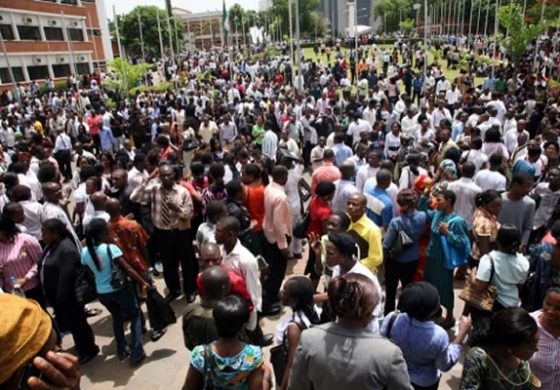
The recent unemployment figures from the National Bureau of Statistics are frightening enough to engage the interest of every Nigerian. According NBS the unemployment rate rose from 14.2% to 18.8% in 2017. The labour population in the country also increased from 83.9 million in the second quarter to 85.1 million in the third quarter of 2017. But in contrast the number of Nigerians in full-time employment declined from 52.7 million in the second quarter 2017 to 51.1 million in third quarters. In essence while the labour population added over a million new entrants, another million lost their jobs. Currently there are approximately 30million unemployed people in Nigeria, about the size of Belgium, Denmark, Sweden and Austria put together. This latest report is a mirror for the governments at various levels to assess their policies relating to employment. Clearly it is either we are not doing something right or our efforts are not enough. The NBS may not have presented data on the number of jobs created in the year but the unemployment rate shows that we have lost more jobs that we have created or we have created fewer jobs in comparison to the demand. The cause of the increase is primarily owing to the absence of new jobs to absorb the existing unemployed and the new the entrants into the job market.
We can wish for the creation of three million jobs annually but without a deliberate policy direction, nothing meaningful will happen. Jobs are not created by wishful thinking and politically correct declarations. Jobs are created through thorough thinking, strategic planning and conscious execution. The government needs to see this as an emergency and a time bomb waiting to explode. There is currently no comprehensive plan primarily targeted at job creation in the country. The dangers of unemployment are too grave to ignore. Apart from the limitation it places on the economic growth of the country, it also poses a significant security threat. Notably, a substantial segment of the unemployed population consists of youths who are in their prime in all respects. The unavailability of legitimate jobs pushes them into discharging their exuberances on other vices that may be disadvantageous to the society. It is ironic that the unemployment rate is increasing under a government that validated the National Economic Policy (NEP). A recent review of the NEP recommends some areas that require urgent intervention in job creation. The review recommends the creation of a functional education system, which aligns the overall education and skill training with the demand of the labour market in Nigeria; the development of a rich and formal technical and vocational education system in Nigeria.
Other recommendations are the enhancement of the capacity of businesses in the private sector to drive the economy and lead in employment generation and labour absorption in the country; improvement of market access to locally made goods and services and provision of physical infrastructure, particularly electricity to reduce cost of production. The NEP review also recommends continuous transformation of sector value-chains in agriculture, non-oil mining and solid minerals and creative industry production into diversified ventures; and increase in support for environmentally friendly activities, which generate employment opportunities (i.e., Green Jobs) in different sectors and enable inclusive economic growth.
It appears the government has abandoned the NEP or probably forgotten such document even exists. There is no gain in drafting a policy that will not be remembered or executed to the benefit of the Nigerian people. At an event on the review of the NEP, the Minister of Labour and Employment, Dr. Chris Ngige stated that “There is urgent need to engage a larger percentage of the productive age in decent, fairly remunerated and sustainable means of livelihood either as wage earners or self-employed, while preserving existing gainful employments.” However since this statement was made in 2016 the Minister has not presented Nigerians with figures on how many jobs have been created by his ministry. No one is really interested in government creating jobs because they cannot provide jobs for all the unemployed in the situation. The primary role of the government is to create the enabling environment through the right policies and actions. In this regard, the Ministry of Labour and Employment, and the Ministry of Trade and Investment have become too docile seeing that job creation is part of their KPIs. There appears to be no policy direction from these two ministries that should spearhead the creation of jobs in the country. The two ministers should see the latest NBS report as call to action in the coming year. A good starting point may be strategic implementation of the National Economic Policy working in harmony with the private sectors and other relevant ministries and departments of the government. Our nation is too volatile to ignore increasing unemployment figures. We must act now.